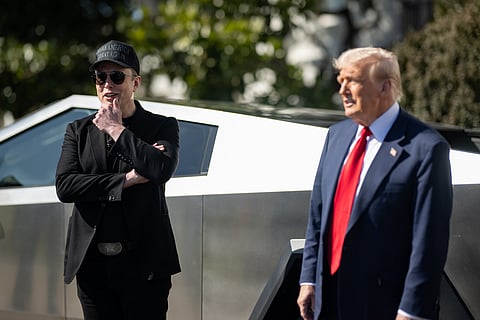

Elon Musk announced late Thursday that he is leaving his role as a top adviser to U.S. President Donald Trump after five months leading the newly created Department of Government Efficiency (DOGE).
In a post on his social media platform X, Musk thanked Trump for the opportunity to helm DOGE, an initiative established via executive order on the president’s first day in office.
“As my scheduled time as a Special Government Employee comes to an end, I would like to thank President Donald Trump for the opportunity to reduce wasteful spending,” Musk wrote. “The DOGE mission will only strengthen over time as it becomes a way of life throughout the government.”
His departure comes one day after CBS aired an interview in which Musk expressed disappointment with Trump’s signature legislative proposal, dubbed the “Big Beautiful Bill.” The bill combines tax cuts with stricter immigration enforcement, which Musk criticized as a “massive spending” measure that would inflate the federal deficit and “undermine the work” of DOGE.
“I think a bill can be big or it could be beautiful,” Musk said. “But I don’t know if it could be both.”
Musk’s exit concludes a contentious chapter marked by sweeping layoffs, agency dismantlings, and legal challenges. Tasked with streamlining the federal government, the Tesla and SpaceX CEO initially pledged to cut $2 trillion in spending—a target he later reduced to $1 trillion, then slashed further to $150 billion.
His aggressive approach led to an estimated 260,000 job cuts within the federal workforce, though some terminations were reversed after court rulings. The rapid downsizing occasionally backfired, including erroneous layoffs within the U.S. nuclear program.
Musk, who had never held public office before, frequently clashed with veteran administration officials resistant to his restructuring efforts. He also faced mounting political backlash, with DOGE becoming a frequent scapegoat for broader discontent with Trump’s policies.
“Doge is just becoming the whipping boy for everything,” Musk told The Washington Post last month. “Something bad would happen anywhere, and we would get blamed for it even if we had nothing to do with it.”
Musk’s role was always intended to be temporary, and he had recently signaled plans to refocus on his companies, including Tesla, SpaceX, and X. His government tenure coincided with a 13% drop in Tesla’s first-quarter deliveries—its steepest decline ever—though its stock has since largely recovered.
Activist backlash against Tesla also intensified during his time in Washington, with protests, vandalism, and calls for boycotts. U.S. Attorney General Pam Bondi warned that such acts could be treated as “domestic terrorism.”
Musk, who spent over $250 million supporting Trump’s 2024 campaign, announced last week that he would scale back political donations. Despite his earlier enthusiasm—he once declared, “Frankly, I love [Trump]”—he grew increasingly frustrated with Washington’s bureaucratic inertia.
“The federal bureaucracy situation is much worse than I realized,” Musk said in a recent interview. “It sure is an uphill battle trying to improve things in D.C., to say the least.”
His departure leaves DOGE’s future uncertain as the administration continues its broader push to shrink the federal government.